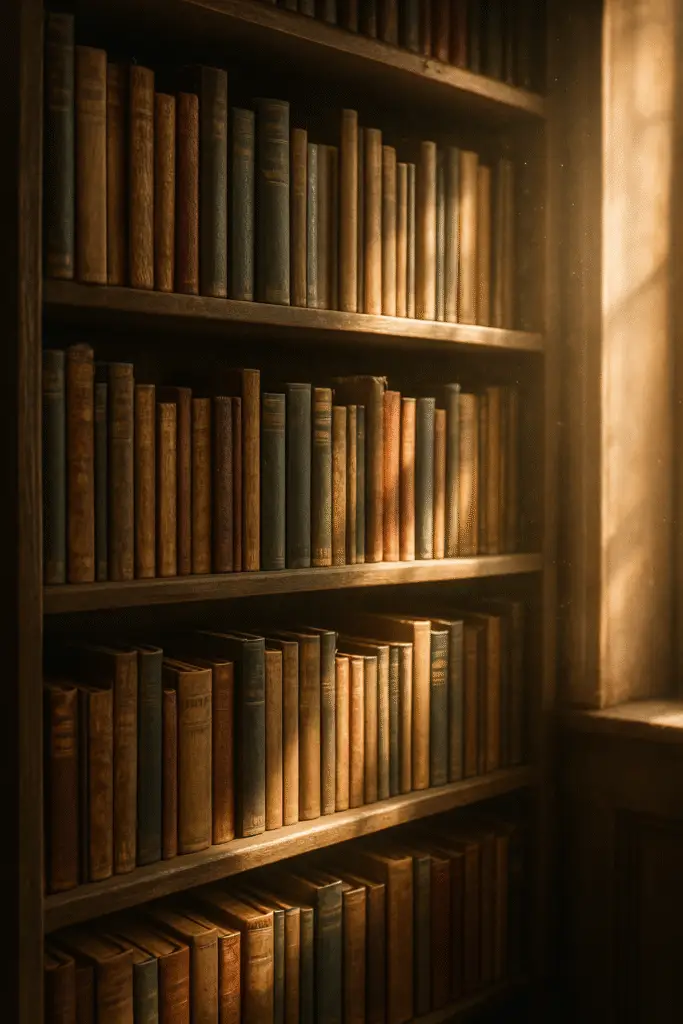The Silent Autobiography: What My Bookshelves Reveal About Me
There is, perhaps, no more honest or unflinching a biographer than one’s own bookshelf. In an age of curated social media profiles and polished resumes, where we so carefully sculpt the image we present to the world, our bookshelves remain a stubbornly authentic record of who we are, who we were, and who we aspire to become. They are the quiet, cumulative archive of a mind in progress. Unlike a digital history that can be deleted with a click, each physical book is a tangible artifact, its spine often creased from the pressure of a hand, its pages perhaps annotated with the frantic scribbles of a past self. A recent evening, while searching for a half-forgotten title, I found myself not merely scanning a collection, but embarking on an impromptu archaeological dig of my own life, a journey narrated by the silent, steadfast sentinels lining my study walls.
My collection, I noticed with a fresh perspective, is not organized by the cold, formal decree of a librarian—no strict adherence to the Dewey Decimal System here. Instead, it is a living topography, mapped by the eras and emotions of a life lived. It is a chronology of curiosity, a physical manifestation of intellectual and emotional evolution. To run a finger along these shelves is to trace the contours of my own development, from wide-eyed wonder to ambitious striving, and finally, to a more nuanced engagement with the complexities of the world.
The Summit of Ambition: Where Enterprise Meets the Soul
The highest shelf, the one at eye level, hums with a distinct, almost audible energy—the crackle of ambition and the call to adventure. This is the command center, the strategic mind of the collection. Here, the raw, entrepreneurial fire of Richard Branson’s “Losing My Virginity” and the pragmatic wisdom of “Business Stripped Bare” sits comfortably, almost conspiratorially, next to the soulful quests in Paulo Coelho’s “The Alchemist” and “Manual of the Warrior of the Light.” At first glance, this might seem an odd coupling—the hard-nosed world of commerce alongside spiritual allegory. But their juxtaposition is, I realize, the defining thesis of a significant chapter of my life. It was a period built on the belief that the world of business is not merely a practical pursuit of profit and loss, but a grand, human adventure in its own right. It demands the heart of a warrior—resilient, principled, and open to omens—and the mind of a strategist who can navigate market forces and balance sheets.
Flanking these core texts are other voices that shaped this philosophy. Malcolm Gladwell’s “Outliers” offered a sociological framework for success, suggesting that triumph is not merely born but built through circumstance and a relentless ten-thousand-hour grind. Simon Sinek’s “Start With Why” provided the moral compass, arguing that the most enduring ventures spring from a sense of purpose. This shelf, therefore, is not just about “how to” but “why to.” It represents a time of synthesizing the external drive for achievement with an internal search for meaning, a conviction that one could build a career without compromising one’s soul.
The Middle Realm: Navigating the Labyrinth of History and the Human Heart
Descending a shelf is akin to moving from the sunlit, active battlefield of commerce into the more shadowed, complex halls of history and the human condition. This is the realm of reflection, where the questions become grander and the answers more elusive. Here, the intricate, often contentious narratives of a nation’s birth are explored through works like RNP Singh’s “Nehru: A Troubled Legacy,” while the timeless, profound struggles of conscience and morality are laid bare in the formidable, dog-eared pages of Dostoevsky’s “Crime and Punishment.” These are not easy reads; they are arduous pilgrimages. They do not offer comfort but demand confrontation—with the sins of our collective past and the dark potential within every individual soul. The weight of Raskolnikov’s psychological torment is palpable, a heavy counterbalance to the facile certainties one often craves.
Yet, this gravity is masterfully balanced by the presence of the sharp, observant wit of Bill Bryson. His “A Short History of Nearly Everything” and “Notes from a Small Island” act as a crucial pressure valve, a bridge back to levity and the tangible world. Bryson reminds me that deep understanding and profound insight are not the sole province of the somber and the tragic. They can also be found in laughter, in the honest, bewildered observation of the world as it is, in its absurdity and its brilliance. This middle shelf, then, is a dialogue—between the tragic and the comic, the political and the personal, the monumental and the mundane. It is where I learned that to understand humanity, one must be able to hold both Dostoevsky’s despair and Bryson’s delight in mind at once.
The Foundational Layer: The Bedrock of Enchantment
Further down, almost at knee-level and slightly tucked away, I find what I can only describe as the foundational layer of my psyche. These are the well-loved, sometimes tattered, timeless tales from Enid Blyton and the fantastically morbid, subversive genius of Roald Dahl. The spines of “The Magic Faraway Tree” and “Charlie and the Chocolate Factory” are faded, their pages soft from countless childhood readings. One might be tempted to dismiss these as simple relics of youth, mere children’s stories that have been outgrown. But to do so would be to miss their profound significance. Are these not the original sparks that ignited the fire of curiosity? Before we seek adventure in business ventures or perspective in historical tomes, it is these stories that first teach us the fundamental, life-altering truth: that other worlds are possible.
Blyton’s enchanted woods and magical trees taught me that wonder was just a hidden door away, that the ordinary could, at any moment, yield to the extraordinary. Dahl, with his wicked sense of justice and celebration of the peculiar, instilled an early appreciation for the outsider and a healthy skepticism toward adult authority. They are the bedrock upon which a life of reading is built, the primal encoding that assures us that stories are not a diversion from life, but a vital key to understanding it. They are the reason I still believe in magic, not of the wands-and-wizards variety, but of the kind that reveals hidden depths in the world and in people.
The Unfinished Wing: The Maps of Tomorrow
No bookshelf is a completed monument; it is always under construction. A small, dedicated section to the right acts as the “unfinished wing,” a space for current explorations and future selves. Here, a beginner’s guide to Python shares space with a thick volume on the history of cartography and a recent novel by a promising debut author. This is the frontier, the tangible evidence of a mind that knows it has only just begun to learn. It is a collection of maps to territories I have not yet visited, languages I have not yet spoken. The presence of this section is a quiet promise I make to myself—a commitment to remain a student, to welcome the discomfort of not knowing, and to allow my identity to be reshaped by the next great book I have yet to read.
The Cumulative Narrative: A Life in Volumes
In the end, my bookshelf tells a story not of a single self, but of a cascading, interconnected series of selves. It is a journey that began with the simple, unadulterated wonder of a child’s story, grew into the youthful, energetic quest for adventure in both travel and enterprise, and deepened into a patient, ongoing conversation with the complex, beautiful, and troubled soul of humanity. Each book is more than an object; it is a ticket to a time and place, a memory of a specific chair and a specific light, a guide that offered counsel at a crossroads, and a mirror that reflected back a version of me I was either proud of or determined to change.
So, I put the question to you. The next time you find yourself at a loss, standing before your own collection, take a moment to really look. Read the spines not for their titles, but for their story. What silent autobiography have you been writing all these years? What, I wonder, does your bookshelf say about you?



